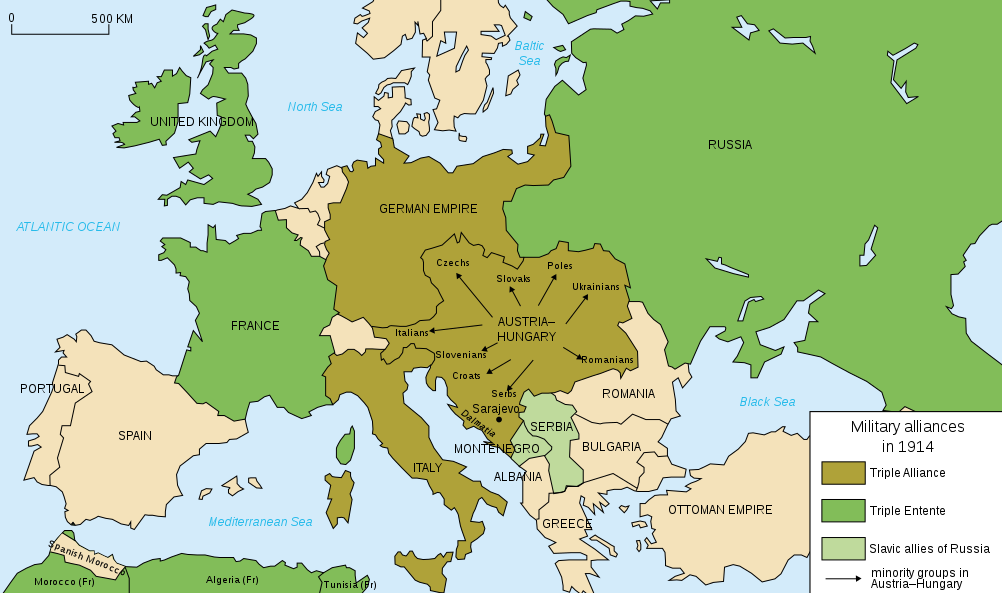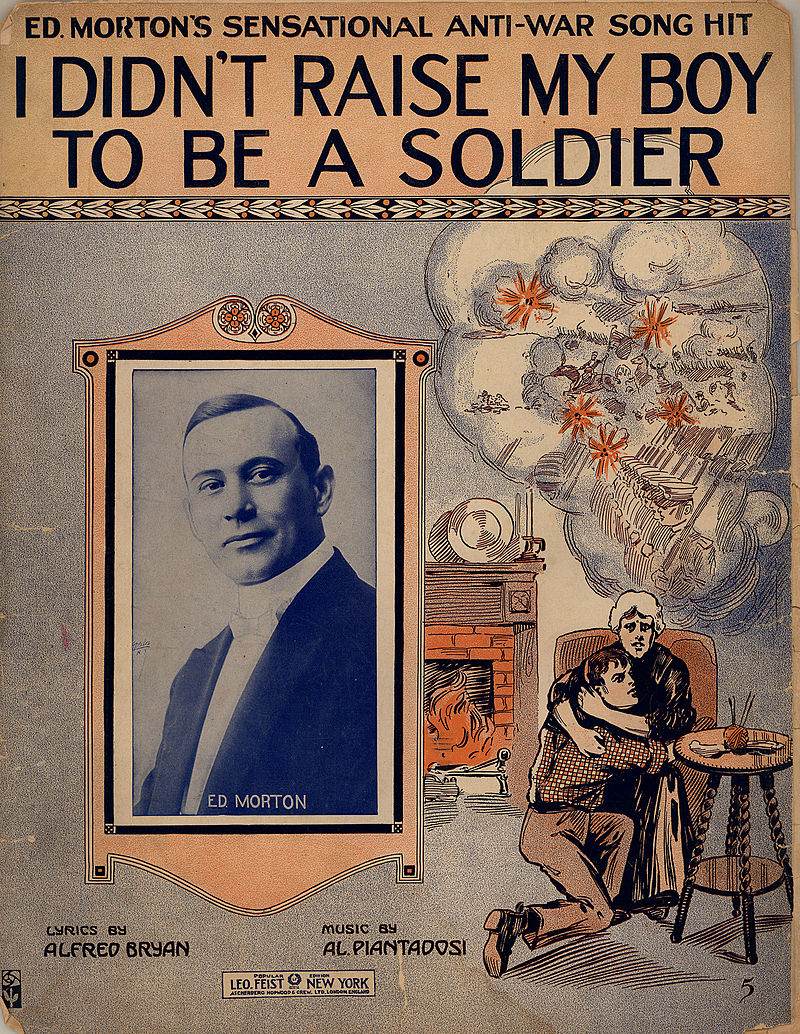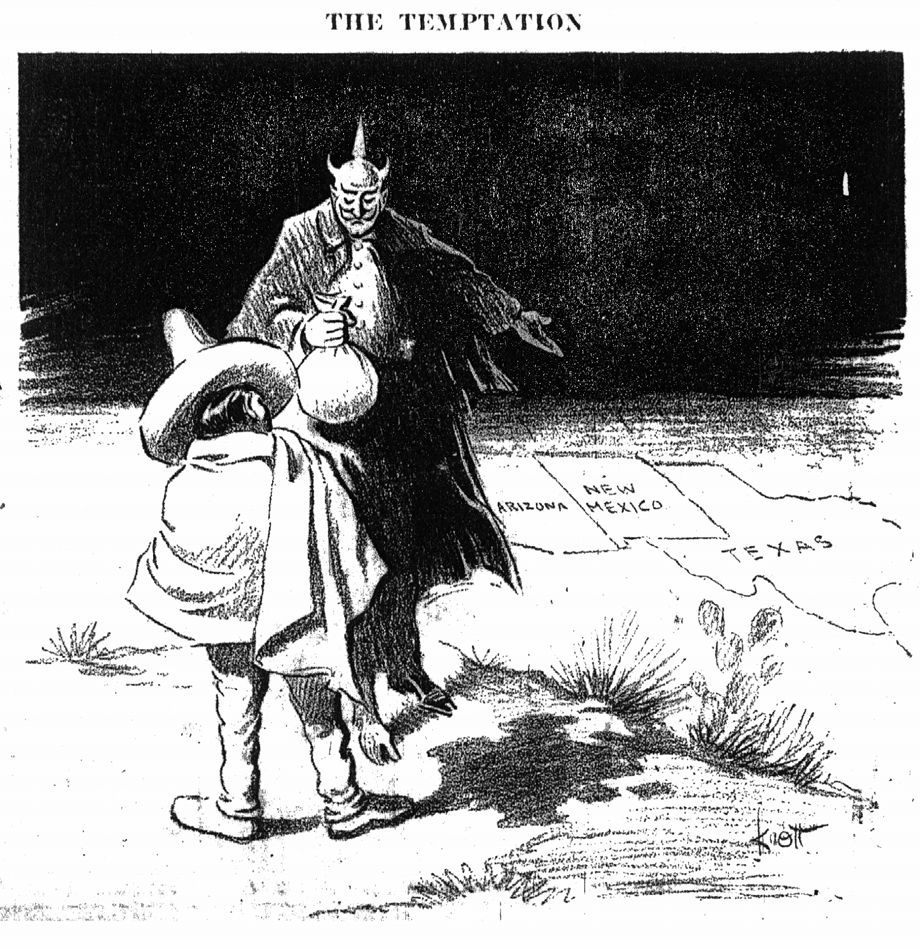PRINT VERSION
JUMP TO
TRANSLATE
INTRODUCTION
When he took office in 1913, President Wilson promised that the United States under his leadership would be a different sort of neighbor to the nations of the rest of the world. Unlike Theodore Roosevelt and William Howard Taft who were unashamed to cast America’s weight around in the form of military or economic muscle, Wilson promised to use America’s power for good. His Moral Diplomacy meant that the United States would fight for people to have a say in their own destiny. He disliked Europeans and their colonial empires. He wanted fairness.
Any student of history can easily see the hypocrisy in Moral Diplomacy. Wilson sent the armed forces into Latin American nations multiple times, including General Pershing’s futile attempt to chase down Pancho Villa in Mexico. He made no attempt to undo imperialist takeovers of Puerto Rico, Guam, the Philippines or Hawaii. It would seem that Wilson’s moral diplomacy was more about telling other countries what they should do rather than making the United States itself a model of those moral ideas.
The greatest test of Wilson’s diplomatic talents was not regarding imperialist interventions in Latin America, however. His real test was related to World War I. As European nations set about slaughtering one another on the fields of France and Belgium, Wilson did his best to maintain American neutrality. Americans supported his efforts. One popular song of the day was “I Didn’t Raise My Boy to Be A Soldier.”
Wilson’s desire to keep America out of a terrible war that it didn’t start conflicted, however, with his desire for the United States to be a leader in determining the future of world affairs and to be a force for good. Since he couldn’t stop the war, how could he use the war to, as he would later say, “make the world safe for democracy?” Could moral diplomacy work in the real world? Could good come out of something so evil?
ALLIANCES IN EUROPE
1915 marked the end of a long period of peace between the world’s most powerful nations. 100 years before, Europe had united to defeat French Emperor Napoleon. After Napoleon’s defeat, the United Kingdom, France, Prussia, Russia, and Austria met in Vienna. These nations decided that if power in Europe was balanced, then no nation could pose a threat to the others.
However, in 1871, several small German nations combined into the German Empire and Chancellor Otto Von Bismarck began to construct a web of alliances to protect German dominance. Austria-Hungary, Italy, and Germany formed an alliance, and in 1887, the Reinsurance Treaty ensured that Russia would not interfere in a war between France and Germany. This upset the traditional balance of power. Most concerned was France, a traditional enemy of Germany. However, Germany and Great Britain remained on good terms, as Germany had not built a navy that might challenge British sea power.
During this time, Queen Victoria of Britain built alliances in her own way. During years of relative peace, she had her children marry into many of the royal families of Europe, believing that this would solidify relations among the nations. In the first decade of the 1900s, the Kaiser of Germany and the King of England were cousins through Victoria, as were the Tsar and Tsarina of Russia.
In 1890, Kaiser Wilhelm II fired Bismarck and took over responsibility for Germany’s foreign policy himself. He decided to build up the German navy, antagonizing Great Britain, and did not renew German agreements with Russia in 1894. As a result, Russia formed a new alliance with Germany’s rival France. Secondary Source: Map
Secondary Source: Map
Europe in 1914 was divided into two camps, the Triple Alliance and the Triple Entente. The United States eventually entered the war on the side of the Entente.
In 1904, France and the United Kingdom decided to end centuries of bitter enmity by signing the Entente Cordiale, an unusual agreement between former enemies that was signed specifically to counter the growing military power of Germany. Three years later, those two nations and Russia entered the Triple Entente with Russia. In response, Germany, Austria-Hungary, and Italy confirmed their alliance forming the Triple Alliance, or Central Powers.
Each nation felt that developing alliances was essential for protection, but the alliances led everyone to fear that its neighbors were more powerful, and had more powerful friends. The result was that Europe’s most powerful nations, Great Britain, France, Russia, Germany and Austria-Hungary all began building up their militaries in preparation for war.
WAR BREAKS OUT
Austria-Hungary was a patchwork of several nations ruled by the Habsburg family. Several ethnic groups resented rule by the Habsburgs. In June, 1914, the heir to the throne, Archduke Franz Ferdinand, traveled to Sarajevo in Bosnia and Herzegovina. A Serbian nationalist named Gavrilo Princip, who hated Habsburg rule, assassinated the Archduke and his wife as they drove through the city in an open car. This assassination triggered the First World War.
The Austro-Hungarian government decided to retaliate by crushing Serbian nationalism. They threatened the Serbian government with war. Russia came to the aid of the Serbs. To oppose this alliance, Austria-Hungary called on Germany. Kaiser Wilhelm II said his country would give Austria-Hungary whatever it needed to win the war.
In July 1914, Austria-Hungary declared war on Serbia. Austria-Hungary, Russia, and Germany began to mobilize their troops. The conflict in Austria-Hungary quickly spread over Europe. Germany’s military leaders understood that war between Austria-Hungary and Serbia, meant war between Austria-Hungary and Russia, which would in turn bring Germany into the conflict, and then France as well. They did not want to fight a defensive war with their most powerful enemy France, and convinced Kaiser Wilhelm II that their best chance for battlefield success was to strike first.
In August, Germany declared war on France. The Germans demanded that Belgium allow German troops to pass through the neutral nation. When King Albert of Belgium refused, Germany violated Belgian neutrality and invaded. Belgium appealed to Great Britain for aid. The British House of Commons threatened that Great Britain would wage war against Germany unless it withdrew from Belgium. The Germans refused, and Britain joined the battle. The Central Powers, Germany and Austria-Hungary, were pitted against the Allies, the United Kingdom, Russia, and France.
THE TECHNOLOGIES OF WAR
The Great War, as it was called, was unlike any war that came before it. In previous European conflicts, troops typically faced each other on open battlefields. But these wars had occurred before the Industrial Revolution. World War I saw new military technologies that turned war into a conflict of prolonged trench warfare in which the enemies dug long lines of defense and faced each other across a decimated no man’s land. Both sides used new artillery, tanks, airplanes, machine guns, barbed wire, and, eventually, poison gas. All of these weapons strengthened defenses and turned each military offense into barbarous sacrifices of tens of thousands of lives with minimal territorial advances in return. By the end of the war, the total military death toll was ten million, as well as another million civilian deaths attributed to military action, and another six million civilian deaths caused by famine, disease, or other catastrophes brought about by the conflict. Primary Source: Photograph
Primary Source: Photograph
The machine gun was a new invention in World War I and was too large and heavy to be carried by one person. As a result, it and many other new technologies worked better as defensive weapons than offensive ones.
One terrifying new piece of technological warfare was the German unterseeboot, German for “undersea boat” or U-boat. To limit Germany’s industrial capability during the war, Britain had blockaded German ports with its superior navy. In 1915, in an effort to break the British blockade and turn the tide of the war, the Germans dispatched a fleet of these submarines around Great Britain to attack both merchant and military ships.
The U-boats acted in direct violation of international law, attacking without warning from beneath the water instead of surfacing and permitting the surrender of civilians or crew. By 1918, German U-boats had sunk nearly five thousand vessels. Of greatest historical note was the attack on the British passenger ship, Lusitania, on its way from New York to Liverpool on May 7, 1915. The German Embassy in the United States had announced that this ship would be subject to attack for its cargo of ammunition, an allegation that later proved accurate. Nonetheless, almost 1,200 civilians died in the attack, including 128 Americans. The attack horrified the world, galvanizing support in England and beyond for the war. This attack, more than any other event, tested President Wilson’s desire to stay out of what had been a largely European conflict. Primary Source: Sheet Music Cover
Primary Source: Sheet Music Cover
The war was a bonanza for publishers of sheet music. At a time before radio and record players were common, when most Americans purchased music to play themselves, certain songs were bestsellers. This particular song, was a hit before the United States joined the war. Afterward, “Over There” was the top choice of armature musicians.
AMERICAN NEUTRALITY
Despite the loss of American lives on the Lusitania, President Wilson stuck to his path of neutrality in Europe’s escalating war, in part out of moral principle, in part as a matter of practical necessity, and in part for political reasons. Few Americans wished to participate in the devastating battles that ravaged Europe, and Wilson did not want to risk losing his reelection by ordering an unpopular military intervention. For Wilson, the conflict did not reach the threshold of a moral imperative for American involvement. It was largely a European affair involving numerous countries with whom the United States wished to maintain working relations. In his message to Congress in 1914, the president noted, “Every man who really loves America will act and speak in the true spirit of neutrality, which is the spirit of impartiality and fairness and friendliness to all concerned.”
Wilson understood that he was already looking at a difficult reelection campaign in 1916. He had only won the 1912 election with 42% of the popular vote, and likely would not have been elected at all had Roosevelt not come back as a third-party candidate to run against his former protégée Taft. Wilson felt pressure from all different political constituents to take a position on the war, yet he knew that elections were seldom won with a campaign promise of “If elected, I will send your sons to war!” Facing pressure from some businessmen and other government officials who felt that the protection of America’s best interests required a stronger position in defense of the Allied forces, Wilson agreed to a “preparedness campaign” in the year prior to the election. This campaign included the passage of the National Defense Act of 1916, which more than doubled the size of the army to nearly 225,000, and the Naval Appropriations Act of 1916, which called for the expansion of the navy, including battleships, destroyers, submarines, and other ships.
As the 1916 election approached, the Republican Party hoped to capitalize on the fact that Wilson was making promises that he would not be able to keep. They nominated Charles Evans Hughes, a former governor of New York and sitting Supreme Court justice at the time of his nomination. Hughes focused his campaign on what he considered Wilson’s foreign policy failures, but even as he did so, he himself tried to walk a fine line between neutrality and belligerence.
In contrast, Wilson and the Democrats capitalized on neutrality and campaigned under the slogan “He kept us out of war.” The election itself remained too close to call on election night. Only when a tight race in California was decided two days later could Wilson claim victory in his reelection bid, again with less than 50% of the popular vote. Despite his victory based upon a policy of neutrality, Wilson would find true neutrality a difficult challenge. Several different factors pushed Wilson, however reluctantly, toward the inevitability of American involvement.
GOING TO WAR
It is hard to point to one key factor that made President Wilson and the American people change their mind about joining the war.
One key factor driving American engagement was economics. Great Britain was the country’s most important trading partner, and the Allies as a whole relied heavily on American imports from the earliest days of the war. Specifically, the value of all exports to the Allies quadrupled from $750 million to $3 billion in the first two years of the war. At the same time, the British naval blockade meant that exports to Germany all but ended, dropping from $350 million to $30 million. Likewise, numerous private banks in the United States made extensive loans – in excess of $500 million – to England. J. P. Morgan’s banking interests were among the largest lenders. Certainly, the war was good for business, and American bankers were eager to see the Allies win.
Another key factor in the decision to go to war were the deep ethnic divisions between native-born Americans and recent immigrants. For those of Anglo-Saxon descent, the nation’s historic and ongoing relationship with Great Britain was paramount, but many Irish-Americans resented British rule over their place of birth and opposed support for the world’s most expansive empire. Millions of Jewish immigrants had fled anti-Semitic pogroms in Tsarist Russia and would have supported any nation fighting that authoritarian state. German Americans saw their nation of origin as a victim of British and Russian aggression and a French desire to settle old scores, whereas emigrants from Austria-Hungary and the Ottoman Empire were mixed in their sympathies for the old monarchies or ethnic communities that these empires suppressed. For interventionists, this lack of support for Great Britain and its allies among recent immigrants only strengthened their conviction.
Germany’s use of submarine warfare also played a role in challenging American neutrality. After the sinking of the Lusitania, and the subsequent August 30 sinking of another British liner, the Arabic, Germany had promised to restrict their use of submarine warfare. Specifically, they promised to surface and visually identify any ship before they fired, as well as permit civilians to evacuate targeted ships. Instead, in February 1917, Germany intensified their use of submarines in an effort to end the war quickly before Great Britain’s naval blockade starved them out of food and supplies. The German high command wanted to continue unrestricted warfare on all Atlantic traffic, including unarmed American freighters, in order to cripple the British economy and secure a quick and decisive victory. Their goal was to bring an end to the war before the United States could intervene and tip the balance. In February 1917, a German U-boat sank the American merchant ship, the Laconia, killing two passengers, and, in late March, sunk four more American ships. These attacks increased pressure on Wilson from all sides, as government officials, the general public, and both Democrats and Republicans urged him to declare war.
The final element that led to American involvement in World War I was the so-called Zimmermann telegram. British intelligence intercepted and decoded a top-secret telegram from German foreign minister Arthur Zimmermann to the German ambassador to Mexico, instructing him to invite Mexico to join the war effort on the German side, should the United States declare war on Germany. It went on to encourage Mexico to invade the United States, as Mexico’s invasion would create a diversion and permit Germany a clear path to victory. In exchange, Zimmermann offered to return to Mexico land that was previously lost to the United States in the Mexican-American War, including Arizona, New Mexico, and Texas. Primary Source: Editorial Cartoon
Primary Source: Editorial Cartoon
In this cartoon, Germany is seen as the devil tempting poor Mexico with the American Southwest. The publication of the Zimmermann Telegram infuriated Americans.
The likelihood that Mexico, weakened and torn by its own revolution and civil war, could wage war against the United States and recover territory lost in the Mexican-American war, especially since Germany would have no way to help the Mexicans, was remote at best. However, combined with Germany’s unrestricted use of submarine warfare and the sinking of American ships, the Zimmermann telegram made a powerful argument for a declaration of war. The outbreak of a communist revolution in Russia in February and abdication of Tsar Nicholas II in March raised the prospect of democracy in Russia and removed an important moral objection to entering the war on the side of the Allies. On April 2, 1917, Wilson asked Congress to declare war on Germany.
Congress debated for four days, and several senators and congressmen expressed their concerns that the war was being fought over economic interests more than strategic need or democratic ideals. When Congress voted on April 6, fifty-six voted against the resolution, including the first woman ever elected to Congress, Representative Jeannette Rankin. This was the largest “no” vote against a war resolution in American history. All the same, the United States had entered the Great War on the side of the Allies.
CONCLUSION
Wilson wanted the United States to lead the world toward a path of honest international friendship. He believed that both nations and people were inherently good and could live peacefully if they chose to. However, again and again during 1915, 1916 and 1917 he was proven wrong. European powers were sending their finest young men to be slaughtered on the battlefield and Germany’s high command ignored American claims of neutrality and sank passenger ships without warning.
Maybe Wilson’s dream of moral diplomacy was just a dream, something that sounded good in a diplomat’s imagination but was never going to be possible when he opened his eyes and looked around at the real world.
What do you think? Is Wilson’s idea of moral diplomacy possible?
CONTINUE READING

SUMMARY
BIG IDEA: Americans did not want to participate in World War I, but eventually chose to join the fight after it appeared Germany was inciting Mexico to attack the United States.
World War I was not originally a war that involved the United States. It started in Europe between the major European powers. Over the few decades before the war began, the Europeans had settled themselves into two groups. The Central Powers included Germany, Austria-Hungary and Italy. The Triple Entente was made up of the United Kingdom, France and Russia. The alliances were intended to provide support in case of attack, but they also had disastrous consequences.
The war began because the heir to the throne of Austria-Hungary was murdered. Austria-Hungary blamed Serbia, which asked for help from Russia. Austria-Hungary asked for help from Germany, and then Russia turned to its friends France and the United Kingdom. By August of 1914, the major powers found themselves going to war. Most historians see it as a terrible mistake – a time when politicians failed to think calmly and take the time necessary to avoid doing things they couldn’t later undo.
All wars are terrible, but World War I was especially bad. Modern technology meant that armies could bring machine guns, World War I is remembered as being especially terrible. Modern technology meant that armies could bring machine guns, gigantic cannons, land mines, barbed wire and poison gas to the battlefield, but these weapons were best used for defense. Under pressure to win victories, generals sent millions of men in attacks with little hope of victory. The result was a slaughter. Although more people died in other wars in history, so many men died for so little during World War I that we remember it as particularly awful. Also deadly were submarines called U-Boats, which the Germans had mastered.
For the first few years of the war, the United States remained neutral. Although most Americans supported the British, French and Russians, they did not want to join the fighting.
Eventually, however, President Wilson asked Congress to declare war because of a combination of factors. The Germans began attacking American ships that were carrying supplies to trade with the United Kingdom and France. Probably the final straw was that Americans learned of a plot to convince Mexico to attack the United States. The idea probably had no chance of success, but it made Americans angry enough to join the war.

VOCABULARY
![]()
PEOPLE AND GROUPS
Queen Victoria: Queen of the United Kingdom from 1837-1901. The time period is often called the Victorian Era.
Wilhelm II: King or Kaiser of Germany during World War I
Archduke Franz Ferdinand: Son of the king of Austria-Hungary who was assassinated in 1914 along with his wife. Their deaths were the spark that started World War I.
![]()
KEY IDEAS
Trench Warfare: Style of combat common on the Western Front during World War I marked by a distinct advantage for the defense.
Neutrality: Refusing to join sides in a war.
![]()
TEXTS
Zimmermann Telegram: Message from the Germany foreign minister to the German ambassador in Mexico encouraging Mexico to enter World War I on the side of the Central Powers. In return, Germany would help Mexico regain lost territory in the American Southwest. The publication of the message angered many Americans.
![]()
SPEECHES
Wilson’s War Message: Speech by President Woodrow Wilson to Congress in 1917 asking for a declaration of War.
![]()
SHIPS
U-Boat: Germany submarine.
Lusitania: British cruise ship that was sunk by Germany U-Boats in 1918. The event pushed many Americans toward support for entering the war on the side of the Allies.
![]()
LOCATIONS
Triple Entente: Alliance between the United Kingdom, France and Russia at the start of World War I
Triple Alliance / Central Powers: Alliance between Germany, Austria-Hungary and Italy at the start of World War I. When the war began, Italy left the alliance.
![]()
EVENTS
Assassination of Franz Ferdinand: Killing of the heir to the throne of Austria-Hungary in 1914 that served as the catalyst for World War I.
The Great War: Nickname for World War I.
Russian Revolution: Overthrow of the Czar of Russia during World War I. Communists under the leadership of Vladimir Lenin eventually took control, founded the Soviet Union, and made peace with Germany.
![]()
LAWS
National Defense Act: 1916 law that doubled the size of the army. It was passed to help prepare for the possibility of entering World War I.
Naval Appropriations Act: 1916 law that funded construction of new ships in preparation for the possibility of entering World War I.
